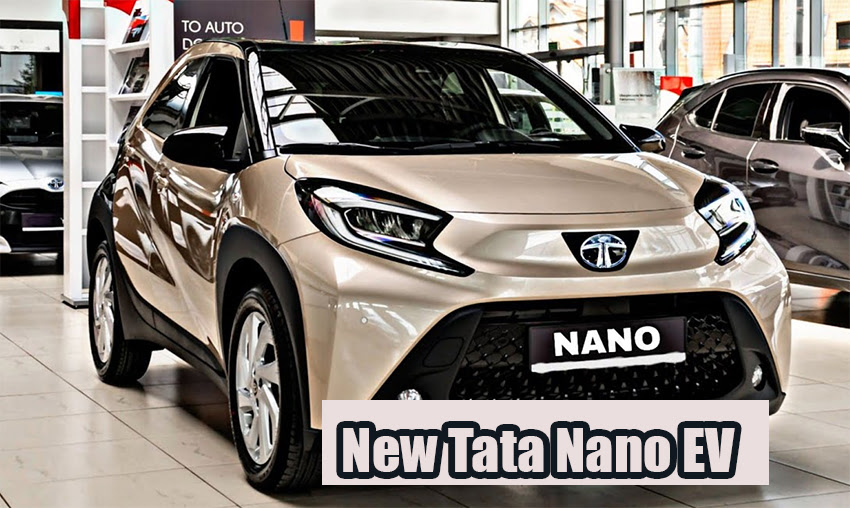New Tata Nano EV- The Tata Nano EV is not officially confirmed, but there are strong rumors and reports of prototypes being tested. If launched, it could feature an affordable electric powertrain with a compact design, ideal for urban commuting. Expected specifications include a lithium-ion battery, 150-200 km range, and a charging time of 4-6 hours. Its price could be around ₹4-5 lakhs, making it one of the most budget-friendly electric cars.
New Tata Nano EV
The Tata Nano, once hailed as the world’s most affordable car, has been a household name in India, particularly among families seeking an economical vehicle. With the increasing shift towards electric mobility and the government’s focus on reducing emissions, rumors about a potential Tata Nano EV have begun to circulate, sparking excitement in the automotive world. Tata Motors has not officially confirmed this, there are strong indications suggesting it might happen.
Is Tata Motors Launching the Nano EV?
Tata Motors has yet to confirm the launch of a Nano EV, but there have been reports of modified electric versions being tested on Indian roads. Spy shots of prototype vehicles have further fueled speculation, but nothing has been officially announced yet. That said, the possibility of a Nano EV has captured the imagination of many, especially considering the growing demand for affordable electric vehicles (EVs) in India.
Read More:-
Expected Features of the Tata Nano EV
If Tata Motors decides to bring the Nano EV to life, we can expect several features that align with the car’s legacy of affordability and practicality, while also incorporating modern electric vehicle technology.
- Eco-Friendly Driving The most significant change would be the transition from a petrol-powered engine to an electric one, making the Nano EV a zero-emission vehicle. This would contribute to reducing urban pollution and offer an eco-friendly alternative for city commuters.
- Compact & City-Friendly Like the original Nano, the EV version would likely be compact and maneuverable, making it perfect for navigating crowded city streets. Its small size would also make parking easier, which is a significant advantage in congested urban environments.
- Cost-Effective Operation EVs are known for their low running costs, and if Tata Motors maintains its commitment to affordability, the Nano EV could become one of the most budget-friendly electric vehicles in India. The low maintenance of electric vehicles would also contribute to its overall cost-effectiveness.
- Battery & Range Based on current industry trends, the Nano EV could come with a lithium-ion battery, offering an estimated range of 150-200 km on a single charge. This range is well-suited for daily city commutes. Charging time is expected to be between 4-6 hours using standard home chargers, ensuring convenience for daily use.
Expected Specifications
While these specifications are based on industry estimates and projections, here’s a glimpse of what the Tata Nano EV might offer:
| Feature | Expected Details |
| Battery Type | Lithium-Ion (If introduced) |
| Range (Per Charge) | 150-200 km (Estimated) |
| Charging Time | 4-6 hours (Home Charging) |
| Seating Capacity | 4 (Standard seating) |
| Top Speed | 80-100 km/h |
| Price (Estimated) | ₹4-5 Lakhs (Ex-showroom) |
These specifications aim to keep the Nano EV affordable while providing the basic needs of a city car, such as a reasonable range, ease of charging, and a comfortable driving experience.
Check Here:-
Potential Challenges
While the concept of a Tata Nano EV is exciting, there are several challenges that could affect its success:
- Battery Costs Batteries remain one of the most expensive components of electric vehicles. As the Nano was designed to be an affordable car, the cost of the battery could increase the price of the EV version, making it less budget-friendly than anticipated.
- Charging Infrastructure Although India’s EV infrastructure is growing, it is still not as widespread as conventional fuel stations. Limited fast-charging infrastructure in smaller cities could hinder the adoption of electric vehicles like the Nano EV.
- Performance Concerns The Nano EV would likely be optimized for city driving, which means it might not perform as well on long highway trips. Its compact nature might also limit the comfort and stability expected on high-speed roads.
Tata Nano EV vs. Other Budget EVs
Should the Nano EV be launched, it would likely compete with other affordable electric cars in India. Here’s how it compares to a few existing options:
| Feature | Tata Nano EV (Expected) | MG Comet EV | Tata Tiago EV |
| Price | ₹4-5 Lakhs | ₹7-8 Lakhs | ₹8.69-11.99 Lakhs |
| Range | 150-200 km | 230 km | 250-315 km |
| Charging Time | 4-6 hours | 7 hours | 3.6 hours (fast charge) |
Read This:-
Final Words
Although Tata Motors has not yet confirmed the launch of the Nano EV, the concept holds significant potential. With its legacy of affordability, the Nano EV could become a game-changer in India’s electric vehicle market, offering an accessible and eco-friendly option for city dwellers. However, until official confirmation is made, everything remains speculative, and we will have to wait for further announcements from Tata Motors.
New Tata Nano EV FAQ’S
Is Tata Motors Launching The Nano EV?
As of now, there is no official confirmation. However, test models have been spotted, indicating that it could be in the pipeline.
What will The Price of Tata Nano EV be?
If launched, it is expected to be priced around ₹4-5 Lakhs, making it one of the most affordable electric cars in the market.
What will The Range of Tata Nano EV be?
Industry estimates suggest a range of 150-200 km per charge, which is suitable for daily city commuting.
